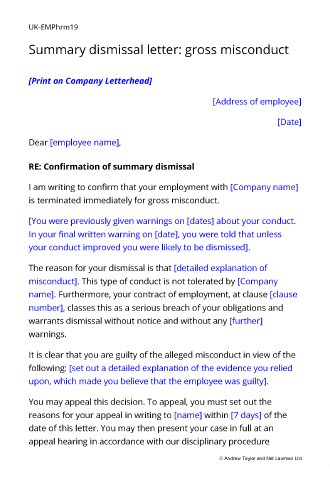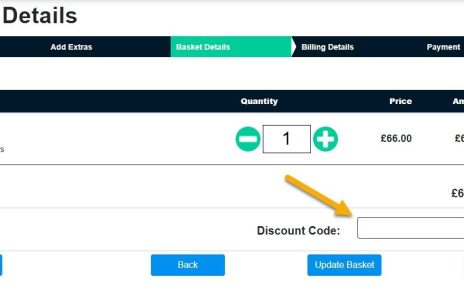Facing potential dismissal for gross misconduct can be daunting, but knowing how to avoid it can safeguard your career. Understanding your company’s policies and maintaining clear communication with your superiors is crucial.
Stay professional and respectful in all situations, and avoid behaviors that could be interpreted as misconduct.
By being aware of your actions and their potential consequences, you can navigate your work environment with confidence and mitigate risks effectively. Emphasizing a positive workplace attitude not only protects you but also contributes to a healthier workplace culture.
How to Avoid Dismissal for Gross Misconduct
When you think about your job, the last thing you want is to face dismissal for gross misconduct. This type of behavior can lead to immediate termination, often without warning. Thus, it’s essential to understand what gross misconduct entails and how you can steer clear of any actions that might put your job in jeopardy. This article will guide you through the various aspects of avoiding dismissal for gross misconduct, focusing on prevention strategies, understanding workplace policies, and maintaining a positive work environment.
Understanding Gross Misconduct
To take proactive measures, you first need to understand what gross misconduct means. In general terms, gross misconduct refers to serious violations of workplace rules. These violations can severely disrupt the work environment, compromise safety, or undermine the trust between employee and employer. Common examples of gross misconduct include:
- Theft: Taking company property or the belongings of colleagues.
- Fraud: Engaging in deceitful practices for personal gain.
- Violence: Physical altercations or aggressive behavior towards colleagues.
- Substance Abuse: Being under the influence of drugs or alcohol at work.
- Harassment: Engaging in bullying or discriminatory behavior.
- Gross Negligence: Major errors that could harm others or the company.
Understanding these actions is vital in ensuring you steer clear of them.
Know Your Company’s Policies
Every workplace has its own set of rules and policies regarding misconduct. Familiarizing yourself with these guidelines can protect you from unintentional violations. Follow these steps to ensure you’re well-informed:
Request the Employee Handbook
Most companies provide an employee handbook when you start your job. This handbook outlines all the workplace policies, including those concerning gross misconduct. If you haven’t received one, don’t hesitate to ask your HR department.
Attend Training Sessions
Companies often conduct training sessions on workplace behavior, ethics, and compliance. Make sure to attend these sessions as they provide crucial information about what is expected of you and what can lead to dismissal.
Ask Questions
If you find something unclear within the policies, ask! Your supervisors or HR representatives can clarify any doubts. Understanding the boundaries can prevent misunderstandings.
Maintain Professional Relationships
A positive work environment is crucial in preventing situations that could lead to gross misconduct. Fostering good relationships with colleagues can help maintain professional boundaries.
Be Respectful
Always treat your coworkers with respect. This includes:
- Using polite language.
- Listening actively during conversations.
- Avoiding gossip and backbiting.
- Showing appreciation for others’ contributions.
A respectful atmosphere reduces the chances of conflict, minimizing the risk of misconduct.
Handle Conflicts Professionally
Disagreements happen in any workplace. It’s how you respond that matters. Follow these steps to manage conflicts without escalating situations:
- Stay calm and composed.
- Address the issue directly but respectfully.
- Seek mediation from a supervisor if needed.
- Focus on finding solutions rather than placing blame.
Resolving conflicts amicably helps avoid emotional outbursts or aggressive behavior that can lead to gross misconduct.
Avoiding Substance Abuse Issues
Substance abuse is a major contributor to gross misconduct in many workplaces. To avoid issues related to this, consider the following:
Know Your Company’s Drug Policy
Be aware of your employer’s policies regarding drug and alcohol use. Many companies have strict guidelines about substance use on or off company property.
Seek Help if Needed
If you find yourself struggling with substance use, it’s important to seek help. Many employers offer Employee Assistance Programs (EAP) that provide confidential support for substance abuse issues. By addressing these problems early, you can prevent potential misconduct.
Prioritize Safety and Compliance
Safety violations can lead to serious consequences, including gross misconduct. Here’s how to prioritize safety in the workplace:
Follow Safety Protocols
Always adhere to safety guidelines set by your employer. This includes using protective equipment, following proper procedures, and reporting hazards.
Participate in Safety Training
Take advantage of safety training sessions offered by your employer. This training keeps you informed about best practices and helps cultivate a safety-first culture.
Effective Communication: The Key to Avoiding Misconduct
Communication plays a vital role in preventing misunderstandings that could lead to disciplinary actions. Here’s how to communicate effectively in the workplace:
Keep Your Boss Informed
Always keep your supervisors in the loop regarding your work and any challenges you face. Open communication fosters trust and transparency.
Provide Constructive Feedback
If you have issues or feedback regarding workplace practices, approach your supervisors constructively. This can prevent feelings of resentment and foster a collaborative environment.
Clarify Misunderstandings Early
If you notice a misunderstanding with a colleague, address it immediately. Clearing the air can prevent escalation and promote a respectful work atmosphere.
Document Your Work and Interactions
Keeping a detailed account of your work and interactions can prove invaluable. Documentation helps to establish a clear record in case any misunderstandings arise.
Maintain a Work Journal
In your journal, note important details such as:
- Tasks completed and any challenges faced.
- Conversations with colleagues and supervisors.
- Feedback received on your performance.
This record can serve as a reference if any disputes about your conduct arise.
Recognize and Report Inappropriate Behavior
Sometimes, misconduct might not involve you directly but can affect you. It’s essential to recognize and report any inappropriate behavior you observe.
Understand the Reporting Process
Familiarize yourself with the process for reporting misconduct in your company. This is often outlined in the employee handbook.
Encourage a Culture of Reporting
Encourage your colleagues to report inappropriate behavior. Cultivating an environment where everyone feels safe to speak up can significantly prevent misconduct.
Avoiding dismissal for gross misconduct requires a proactive approach. Educate yourself about workplace policies, maintain professional relationships, prioritize safety, and communicate effectively. By taking these steps, you minimize the risks associated with gross misconduct and foster a positive work environment. Remember, your behavior not only affects you but also your colleagues and the company as a whole. By being aware and respectful, you contribute to a more harmonious workplace that benefits everyone.
Charged for Misconduct? Use These 5 Defences to Clear Your Name
Frequently Asked Questions
“`html
What behaviors can lead to gross misconduct in the workplace?
Gross misconduct typically includes serious violations of company policy or ethical standards. Examples include theft, violence, harassment, fraud, substance abuse, serious insubordination, and significant breaches of health and safety regulations. Understanding and avoiding these behaviors is crucial for maintaining a positive work environment and staying employed.
How can I effectively communicate with my employer to prevent issues?
Open and honest communication with your employer can help prevent misunderstandings and address concerns before they escalate. Schedule regular check-ins, provide feedback on workplace policies, and discuss any issues you encounter. Proactively seeking clarification on expectations and policies can foster a positive relationship and reduce the risk of conflicts that might lead to disciplinary actions.
What role does understanding company policies play in avoiding dismissal?
Familiarizing yourself with your company’s policies and procedures is essential. Read the employee handbook, attend orientation sessions, and participate in training programs. By comprehensively understanding your organization’s rules regarding acceptable behavior, you can avoid actions that may be deemed inappropriate and thus mitigate the risk of gross misconduct claims.
How can I handle conflicts with colleagues to minimize risk?
Managing conflicts effectively involves addressing them calmly and professionally. If disagreements arise, consider discussing the issues privately with the individual involved. If necessary, seek mediation from human resources. Document all interactions and attempts to resolve conflicts to demonstrate your commitment to maintaining a harmonious workplace.
What steps should I take if I witness misconduct at work?
If you observe misconduct, report it to your supervisor or human resources as per your company’s policy. Failing to report unethical behavior can implicate you in the misconduct. Ensure you provide a detailed account of what you witnessed. This shows your commitment to integrity and a safe working environment.
How does performance feedback relate to avoiding gross misconduct?
Regular performance feedback can help you identify areas for improvement and prevent behaviors that might lead to gross misconduct. Actively seek feedback during performance reviews and implement suggestions provided by your manager. This proactive approach demonstrates your willingness to grow professionally and adhere to company expectations.
“`
Final Thoughts
To avoid dismissal for gross misconduct, maintain professionalism and adhere to workplace policies. Understand your company’s code of conduct and stay informed about acceptable behavior.
Communication plays a vital role; always address issues promptly and seek clarification when in doubt.
Maintaining respectful relationships with colleagues and supervisors creates a positive work environment, minimizing the risk of misunderstandings.
By following these guidelines, you can significantly reduce the chances of facing serious disciplinary actions. Ultimately, knowing how to avoid dismissal for gross misconduct is essential for a successful career.





